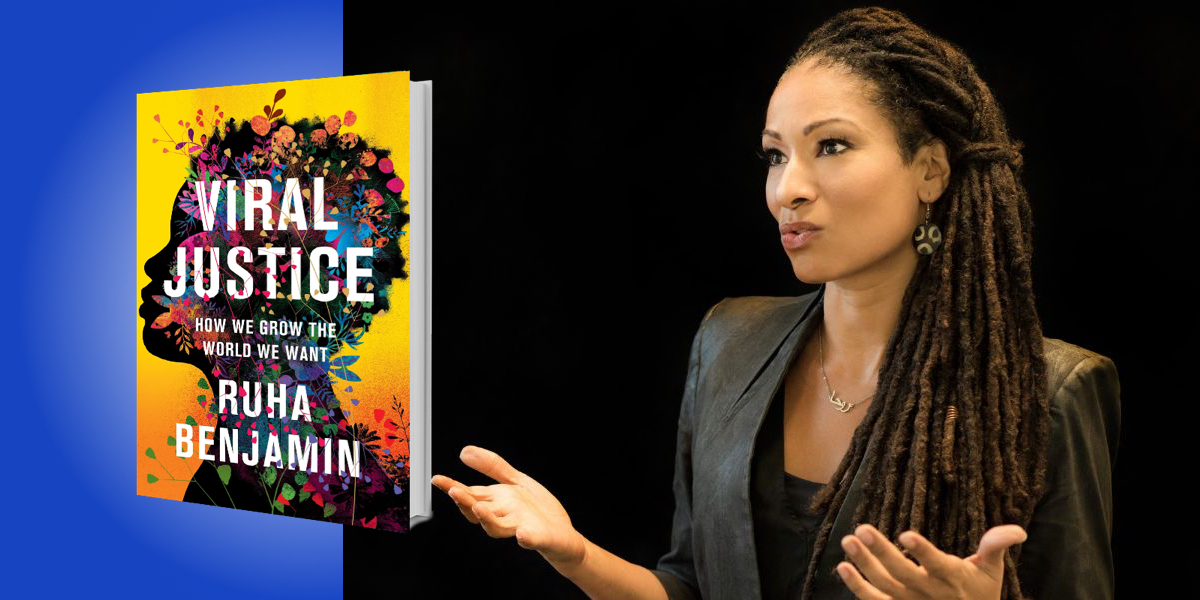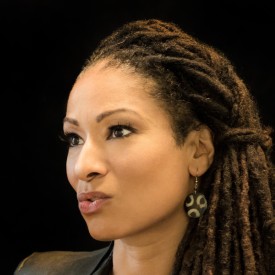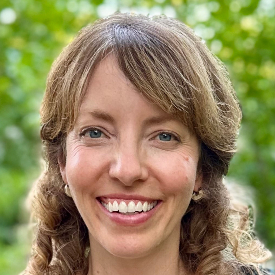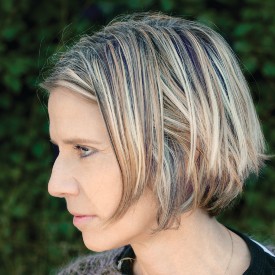Ruha Benjamin is a sociologist and professor of African American Studies at Princeton University. She is also the Founding Director of the Ida B. Wells Just Data Lab. The primary focus of her work is the relationship between innovation and equity, particularly focusing on the intersection of race, justice and technology.
Below, Ruha shares 5 key insights from her new book, Viral Justice: How We Grow the World We Want. Listen to the audio version—read by Ruha herself—in the Next Big Idea App.
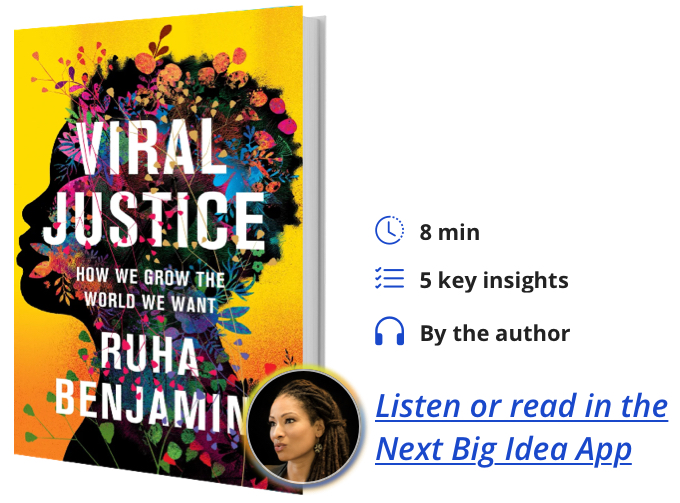
1. We need to learn how weathering affects our well-being.
It’s imperative that we identify and acknowledge how social stressors and oppressors impact ourselves and those around us. These stressors overload our systems, wearing us down over time. Arline Geroniums coined “weathering” as a public health concept in 1992 to underscore how we embody stressors and oppressors in the broader environment and how this process causes preventable illness and premature death.
Asking how we can protect ourselves from weathering is key. There are individual and communal acts—even simple acts of kindness, neighborly deeds—that can transform the weather. Through emboldening one another, strengthening our relationships, and choosing your skillset to be a change-maker, you can help break the dark clouds of oppression and systemic racism in our society.
2. Systems of education are microcosms of inequity.
Ours is an apartheid-like system in the United States, organizing public school children and their opportunities by race and class. Major cities segregate children across schools, and most districts segregate students using class tracking, classified by ability. Majority-white school districts receive $23 billion more in funding than school districts that serve students of color because they draw much more revenue from local property taxes due to historical redlining practices.
“Believing that children are our future is not enough. We need to prioritize targeted investment in Black students.”
How do we make our schools incubators for growing empathy and solidarity instead of segregation? Believing that children are our future is not enough. We need to prioritize targeted investment in Black students. We need to encourage school leaders to apply a critical lens to already existing conversations about racism. We also need to invest in mediation and restorative justice practices instead of administering suspensions, expulsions, and zero-tolerance policies for students when they misbehave.
Spending time and money on solutions to create better educational systems is key for our collective growth and sustainability.
3. Our workplace can serve as a sphere for change.
After we examine children and education, we ought to turn to work culture. We need to look at labor, livelihood, and how people make ends meet in a society shaped by racial capitalism.
Wouldn’t it be a good idea to start reimaging material and social values—centering both on shared prosperity and well-being rather than private accumulation and institutionalized greed?
“Viral justice means each of us doing our part to shift norms and patterns of expectation when it comes to labor, productivity, and rest.”
In the realm of work, we can demand concrete policies through collective action like Universal Basic Income, a federal job guarantee, paid vacation, guaranteed sick leave, and disability accommodations. Reimagining the place of work in our lives also means understanding that rest, like healthy foods, clean water, and fresh air, is essential. Viral justice means each of us doing our part to shift norms and patterns of expectation when it comes to labor, productivity, and rest.
4. Health, education and justice are interdependent.
Each of these elements—weathering, education, work and rest—tie closely to health. Maternal and infant health is the most sensitive indicator of the overall health in any society. Black women in the United States are two and half times more likely to deliver their babies pre-term and three to four times more likely to die during pregnancy and childbirth than white women.
Even the survival rates for white women in the U.S. are lower than they should be. White supremacy, not Blackness, is bad for our health, and it’s killing us.
5. In addition to pushing for a stronger public safety net, we need to cultivate collective wellbeing.
No matter their background, we need to ensure that all current and future healthcare practitioners are knowledgeable about the history and contemporary manifestations of racism in medicine.
“By using viral justice, we can connect the dots between various types of harm.”
Medical students and physicians of all backgrounds need to demand that academic medical centers meet the needs of local Black residents and other communities of color. Building trust among people of color and the medical community is another important step in revitalizing our collective wellbeing.
What might medical reparations look like? Consider a professor’s decision to encourage reading outside the canon, a student’s decision to bring those insights to bear at his university, a lab director’s decision to act beyond the conventions of scientific norms, a medical institute’s decision to put its money where its mission statements are.
All of these might seem like small steps, but together they are trying to shift how institutions operate. This is what viral justice is. By using viral justice, we can connect the dots between various types of harm; from police violence to viruses, dissecting stressors and oppressors that lead to premature death. The only way we can change things is if we join together as a collective and, through small acts, create our own viral justice.
To listen to the audio version read by author Ruha Benjamin, download the Next Big Idea App today:












